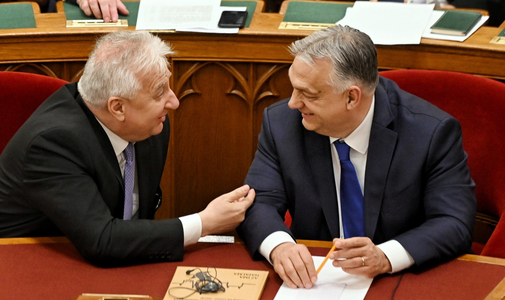There were several occasions during the 20th century when the nationalisms of the peoples of the Carpathian basin fed off each other. While the historical Greater Hungary still stood, politicians representing the minority Slovak, Romanian and Serb peoples complained before the audience of global public opinion about aggressive Hungarianising tendencies, and with good reason. Once they had gained their own states after World War I, they swore to safeguard all the rights of their minority peoples.
Despite this, it emerged at the end of World War II that Benes had devised secret plans to drive out the Hungarians, "a guilty nation", by means of a population exchange, which was successfully carried out.
Romanian nationalists were only prevented from carrying out similar plans by the Soviet Union, which mounted a military invasion of Northern Transylvania that lasted a year and a half. Later, the Soviet Union exerted strong pressure on both Czechoslovakia and Romania to tone down their anti-Hungarian nationalism.
Given this, it is hardly surprising that nationalism continues to be a source of conflict between Hungary, Slovakia and Romania. Romanians and Slovaks continue to present themselves as victims, as they did 100 years ago, blaming the "separatists tendencies" of a minority directed against a peaceful majority.
But our conservative opposition blames the governing Socialist-Liberal coalition for allowing events to get as far as they have, spurring on the nationalists of the neighbouring countries by campaigning against a referendum proposal in December that would have given dual nationality to ethnic Hungarians in neighbouring countries. Since then, Fidesz claims, the Socialists have been weak and useless in bilateral negotiations. They say Romanian and Slovak politicians have washed the floor with our prime minister, Ferenc Gyurcsany.
The most recent events have shown that the situation of the Hungarian minorities is getting worse. In theory, Hungary can turn to Brussels and Strasbourg to protect the interests of the Hungarians of Romania and Slovakia, but they have achieved little. Given what has happened, it comes as little surprise that Babes-Bolyai University in Cluj suspended two of its lecturers on 27 November. They accused Peter Hantz and Kovacs Lehel of distributing flyers and "constantly spreading lies about the institution and the country."
It is strange that the Hungarian government has nothing to say about this affair. Ferenc Gyurcsany's government held a joint cabinet session with the Romanian prime minister 10 days ago in Budapest. At this meeting, agreements were made about major infrastructural plans, and it was also agreed that the restoration of the statue of King Matyas in Cluj would be jointly paid for by the two countries.
But it would seem that even these joint efforts were not enough to convince the Babes-Bolyai University to put up a few Hungarian-language signs alongside the Romanian ones. Catedra de literatura maghiara: it sounds nice enough, and it's certainly multicultural. But if you then put up another sign below it that says "Magyar irodalomtudomanyi tanszek" or Department of Hungarian Literature, then that's separatism, and the university will sack you.
How is that our diplomats are unable to persuade the world that this is an outrage? They should appeal to global public opinion, forcing the Romanian government to put a stop to this discrimination and force the university to reinstate the dismissed lecturers.
The Slovakian government has done something similarly outrageous. They have given more generous state subsidies to towns that are more than 277m above sea level, arguing that the cost of heating and repairing roads is greater in these areas. Other areas receive proportionately less. But what really happened is that they established that these were the areas where there were barely any Hungarians. The government in Bratislava has cut off some 1600 Hungarian towns and villages from receiving almost HUF500bn in development support.
Could there be a more transparent and absurd argument? Yet Hungarians in the governing coalition are unwilling to raise the matter. The leadership of the Hungarian Coalition Party in Slovakia pointed out this disgraceful anomaly, but nothing has changed. This despite the fact that Robert Fico, the Slovak prime minister, recently behaved very dismissively towards Ferenc Gyurcsany, who might therefore be expected to respond more decisively.
There's no question that things are not going too well for Hungarians beyond the border. Maybe the left-liberal coalition believes publicising this abroad would just be pouring oil on the fire without yielding any benefits at home. Yet sweeping things under the carpet is the same as letting the situation deteriorate further.
János Pelle

















